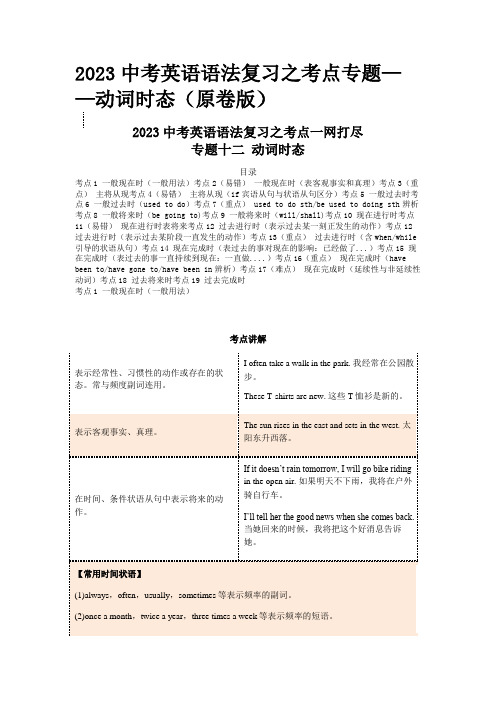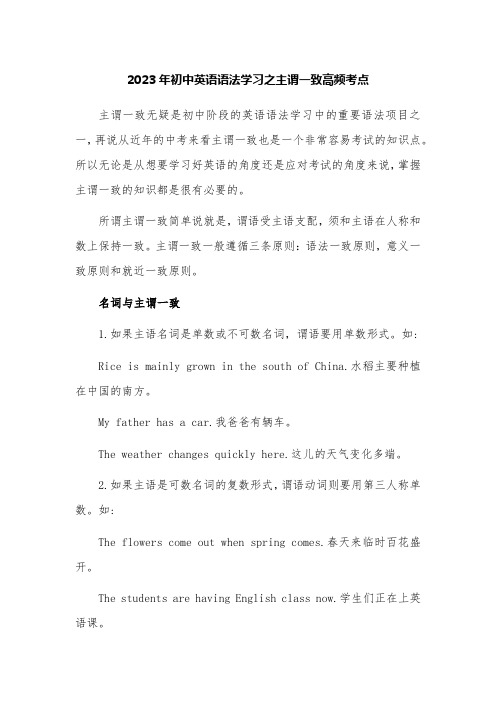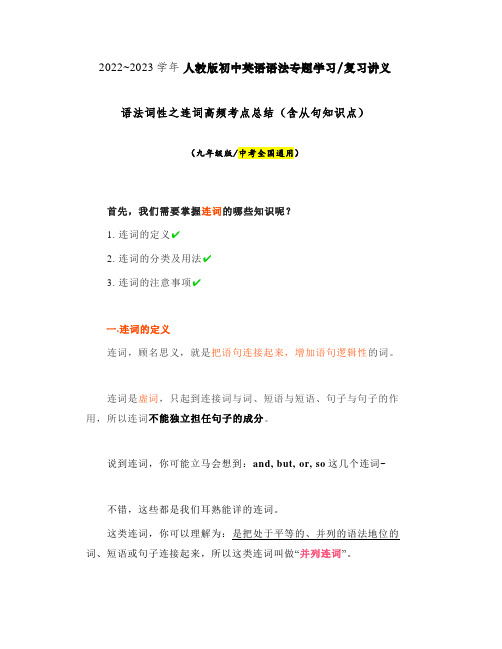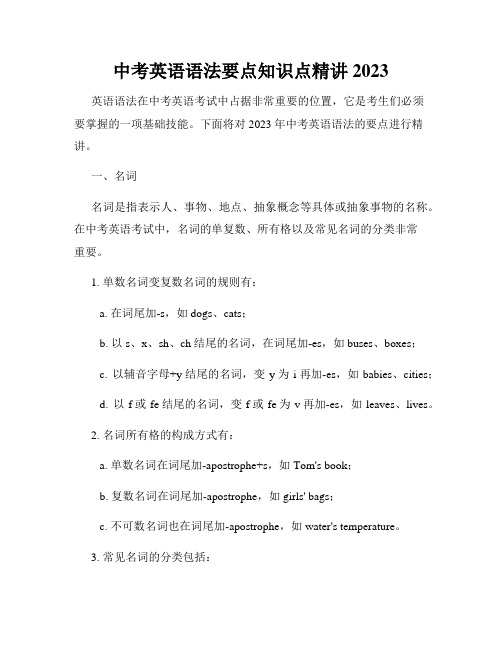2023年中考英语语法易错高频考点汇总
2023中考英语常考语法总结——学习提高必备

2023中考英语常考语法总结——学习提高必备2023中考英语常考语法总结——学习提高必备2023年的中考英语常考语法,是学习英语的重要环节之一。
正确掌握基础语法,可以让我们更好地理解语言本质,从而提高英语水平。
以下是本文对于2023中考英语常考语法的总结,希望对各位学习者提供帮助。
一. 名词名词是英语语法的基础,在句子中通常作为主语、宾语、表语和定语。
在2023年中考中,将常考到名词的以下用法:1. 名词的单复数英语中的名词有单数和复数之分,单数形式用于表示一个人、事物或概念。
复数形式则用于表示多个人、事物或概念。
在句子中,主语和谓语的单复数需要保持一致。
例如:Singular form: applePlural form: apples2. 不可数名词不可数名词通常表示抽象事物、液体、物质等。
在句子中,不可数名词不加“s”来表示复数。
不可数名词前通常需要使用量词来表示数量。
例如:Uncountable noun: waterCountable noun: bottle of water3. 名词性物主代词名词性物主代词可以替代一个名词做主语、宾语或表语,也可以作为定语修饰名词。
在2023年的中考中,名词性物主代词将常用作表达所有权或所属关系。
例如:His jacket is blue. (“His”指代的是某个人,表示这个人的夹克是蓝色的。
)二. 代词代词在英语中是指替代一个名词或名词短语的词。
在2023年的中考中,将常考到代词的以下用法:1. 主格和宾格代词主格代词通常作为主语,而宾格代词则作为宾语。
在句子中,主格代词放在主语位,宾格代词放在宾语位。
例如:Subject pronoun: IObject pronoun: me2. 反身代词反身代词通常用于表示某个动作是被动性的,或表示自己的动作影响到自己本身。
在句子中,反身代词通常作为宾语或表语。
例如:Reflexive pronoun: myselfNon-reflexive pronoun: me三. 动词动词是英语语法体系中的重要组成部分。
2023年人教版中考英语语法点总结

2023年人教版中考英语语法点总结随着近年来中国中学教育的普及和改革,英语作为一门必修科目也一直得到重视。
无论是在小学的英语启蒙,还是初中的学习中,在语法的学习上都是至关重要的。
2023年人教版中考英语,语法是考试重点之一,今天我们就来总结一下在学习语法时,需要掌握哪些点。
一、语态语态分为两种:主动语态和被动语态。
在英语中,使用主动语态和被动语态来表达不同的语气和句意。
一般情况下,主动语态用于强调主语的主动性,而被动语态则强调动作的承受者。
在实际应用中,我们需要判断使用哪种语态,尤其是在使用一些动词时,需要考虑其强调的重点,如“使”“让”“叫”等动词需要用被动语态。
二、时态时态是指动词在句子中表示的时间形式,英语的时态有三种:一般现在时、一般过去时、一般将来时。
其中,一般现在时用于表示一个经常性的动作,一般过去时用于表示过去发生的事情,而一般将来时则用于表示将要发生的事情。
三、语气语气是指句子所表达的情感或态度,英语中主要分为陈述语气、祈使语气和虚拟语气。
陈述语气用于描述事实,而祈使语气则表示命令或请求。
虚拟语气则表示一种虚假的情况,比如表示假设或愿望。
在实际应用中,我们需要考虑句子所表达的情感,以选择恰当的语气。
四、疑问句疑问句是指用来询问的句子,英语中常见的疑问句包括一般疑问句和特殊疑问句。
一般疑问句用于询问是否或否定,常以助动词开头;而特殊疑问句则用来询问一些具体的事实或情况。
在使用疑问句时,需要注意语序的调整以及合适的词汇。
五、倒装倒装是指将主语置于谓语动词之后的一种语言表达方式,英语中常见的倒装有部分倒装和完全倒装。
部分倒装通常用于助动词后面加上主语,而完全倒装则将整个谓语动词移到主语之前。
在实际应用中,倒装常常用于强调句子的某些方面,需要根据具体情况合理运用。
以上就是2023年人教版中考英语语法点的总结。
在学习语法时,我们需要注重掌握基本概念和用法,并且结合实际情况进行运用。
通过系统的学习和不断地练习,我们可以在中考中更加游刃有余地应对各种语法题型。
2023中考英语语法复习之考点专题——动词时态(原卷版)

2023中考英语语法复习之考点专题——动词时态(原卷版)2023中考英语语法复习之考点一网打尽专题十二动词时态目录考点1 一般现在时(一般用法)考点2(易错)一般现在时(表客观事实和真理)考点3(重点)主将从现考点4(易错)主将从现(if宾语从句与状语从句区分)考点5 一般过去时考点6 一般过去时(used to do)考点7(重点) used to do sth/be used to doing sth辨析考点8 一般将来时(be going to)考点9 一般将来时(will/shall)考点10 现在进行时考点11(易错)现在进行时表将来考点12 过去进行时(表示过去某一刻正发生的动作)考点12 过去进行时(表示过去某阶段一直发生的动作)考点13(重点)过去进行时(含when/while 引导的状语从句)考点14 现在完成时(表过去的事对现在的影响:已经做了...)考点15 现在完成时(表过去的事一直持续到现在:一直做....)考点16(重点)现在完成时(have been to/have gone to/have been in辨析)考点17(难点)现在完成时(延续性与非延续性动词)考点18 过去将来时考点19 过去完成时考点1 一般现在时(一般用法)考点讲解1.(2021·上海松江·二模)Tim likes watching films. He _________ to the cinema with his girlfriend once a week.A.goes B.is going C.has gone D.will go2.(2020·湖北恩施)I hear that it often ________ in Sichuan and there are usually floods, especially in summer.A.rains B.rained C.will rain3.(2021·北京房山·二模)Mary ________ her grandparents every weekend.A.visits B.was visiting C.is visiting D.has visited4.(2021·广西桂林)The zebra eats grass, but it ________ eat meat.A.doesn’t B.didn’t C.don’t5.(2021·黑龙江·齐齐哈尔市碾子山区教师进修学校一模)—Do you like the flower? —Yes. It ________ sweet.A.is smelling B.smells C.smelt考点2(易错)一般现在时(表客观事实和真理)考点讲解精选练习6.(2020·天津红桥·二模)In the past, people didn't know the earth ________round the sun. A.going B.goes C.will go D.go7.(2021·吉林长春·模拟预测)The teacher told us that the sun ________ in the east. A.rises B.rise C.rose D.rising考点3(重点)主将从现考点讲解精选练习8.(2021·四川乐山)—What’s your plan for the summer holiday?—I’ll go to Chendu as soon as the school term ___________.A.end B.ends C.will end9.(2021·广西河池)Mrs. Green will take her son to the amusement park if she ________ the tickets.A.got B.gets C.is getting D.will get10.(2021·辽宁丹东)We can’t avoid traffic accidents unless everyone ________ the rules. A.follows B.breaks C.will follow D.will break考点4(易错)主将从现(if宾语从句与状语从句区分)考点讲解精选练习11.(2021·辽宁鞍山)—Tina wants to know if you ________ to the park with us tomorrow. —I’d love to. But if it ________, I may go to the library instead.A.go; will rain B.go; rains C.will go; rains D.will go; will rain12.(2020·黑龙江牡丹江)—I wonder if we ________a farewell party next week. —If we________it, I will call you.A.will have ; have B.have;will have C.will have; will have13.(2021·黑龙江哈尔滨)—I wonder if you ________ us for the English party tomorrow. —If I ________ free, I will go with you.A.will join, am B.will join, will be C.join, am考点5 一般过去时考点讲解精选练习14.(2021·广西贵港)—Where does Bill live? —He ________ me his address, but I can’t remember it now.A.tells B.told C.is telling D.will tell15.(2021·四川达州)— Alice has gone out. — Oh, has she? What time ________ she________?A.has; gone B.will; go C.did; go D.is; going16.(2021·江苏徐州)In my school days, I ________ a lot of reading in English every day. That was how I learned English at that time.A.do B.did C.have done D.will do17.(2021·重庆)Last Sunday my brother and I ________ our grandparents.A.will visit B.visits C.visit D.visited18.(2021·内蒙古兴安盟)— Have you ever been to Shanghai? — Of course. Actually, I________ there for six years, but now I live in Beijing.A.worked B.was working C.would work D.have worked考点6 一般过去时(used to do)考点讲解精选练习19.Mr Jiang isn’t as busy as before because there ___________no home robot to help him.A.used to be B.may be C.used to have D.may have20.I ________ in this small mountain village when I was a child.A.use to live B.used to living C.used to live D.used to life21.(2019·江苏镇江)Yao Ming, a basketball giant , ___________ water polo when he was young.A.is playing B.used to play C.is used to playing D.was playing考点7(重点) used to do sth/be used to doing sth辨析考点讲解精选练习22.(2020·湖南益阳)Diana used to _________ to work, but now she is used to ________ because the road is crowded and she wants to keep fit.A.drive; walk B.drive; walking C.driving; walk23.Dick __________ in America, but he has been ___________ Chinese food since he moved to China.A.used to live; used to eating B.is used to live; used to eat C.is used to live; used to eating D.used to living; used to eat24.—How does your brother go to school? —He ___________ ride a bike, but now he__________ there to keep fit.A.used to; is used to walk B.used to; is used for walking C.was used to; is used to walking D.used to; is used to walking考点8 一般将来时(be going to)考点讲解一般将来时表示将来某个时间要发生的动作,事情或存在的状态,也表示将来经常或反复发生的动作或事情。
2023年初中英语语法学习之主谓一致高频考点

2023年初中英语语法学习之主谓一致高频考点主谓一致无疑是初中阶段的英语语法学习中的重要语法项目之一,再说从近年的中考来看主谓一致也是一个非常容易考试的知识点。
所以无论是从想要学习好英语的角度还是应对考试的角度来说,掌握主谓一致的知识都是很有必要的。
所谓主谓一致简单说就是,谓语受主语支配,须和主语在人称和数上保持一致。
主谓一致一般遵循三条原则:语法一致原则,意义一致原则和就近一致原则。
名词与主谓一致1.如果主语名词是单数或不可数名词,谓语要用单数形式。
如:Rice is mainly grown in the south of China.水稻主要种植在中国的南方。
My father has a car.我爸爸有辆车。
The weather changes quickly here.这儿的天气变化多端。
2.如果主语是可数名词的复数形式,谓语动词则要用第三人称单数。
如:The flowers come out when spring comes.春天来临时百花盛开。
The students are having English class now.学生们正在上英语课。
3. there be句式中的be动词形式根据be后的第一个名词的数而确定用单数还是用复数形式。
如:There is a pen and some books on the desk.书桌上有一支钢笔和几本书。
There are two pandas and a tiger in this zoo.这个动物园有两只熊猫,一只老虎。
4.如果由and连接的两个做主语的单数名词指的是同一个人或物的时候,谓语动词要用单数形式。
如:The singer and actor, Hu Ge, is very handsome.歌星兼演员的胡歌好帅。
The science and technology plays an important part in China.科学技术在中国扮演着重要的角色。
2023年初中英语语法学习之被动语态用法与高频考点(1)

2023年初中英语语法学习之被动语态用法与高频考点如何使用被动语态学习被动语态时,不仅要知道被动语态的各种语法结构,还要知道在哪些情况中使用被动语态。
1. 讲话者不知道动作的执行者或不必说出动作的执行者 (这时可省 by 短语)。
例: My bike was stolen last night.2. 借助被动的动作突出动作的执行者。
例:I was given ten minutes to decide whether I should accept the offer.3. 为了更好地安排句子。
例:The well-known person got on the bus and was immediately recognized by people. (一个主语就够了)主动语态与被动语态的区别在主动语态中,主语后面接人(be +动词原型)被动语态(be+动词过去分词)在主动语态中,主语是谓语动词的使动方。
在被动语态中,主语是谓语动词的受动方。
在语法结构上,主动语态和被动语态的区别主要在于,主动语态直接使用动词原形作为谓语,然后再在该动词原形的基础上施加时态和其他语法;而被动语态则使用系词+动词的过去分词作为谓语,各种时态和其他语法也施加在系词上。
举例:1.主动语态:The snowslide killed him. 雪崩害死了他。
被动语态:He was killed by the snowslide. 他死于雪崩。
2.主动语态:We use electricity to run machines. 我们用电力来开动机器。
被动语态:Electricity is used to run machines. 电力被我们用来开动机器。
3.主动语态:Bell invented the telephone in 1876.贝尔于1876年发明了电话。
被动语态:The telephone was invented by Bell in1876.电话是贝尔于1876年发明的。
中考语法重点与易错点梳理

中考语法重点与易错点梳理一、名词性从句名词性从句作主语、宾语、表语或同位语,常见引导词有that, whether, if, who, whom, whose, which。
例句:1. Who will go to the party remains uncertain. (主语从句)2. I don't know whether/if it will rain tomorrow. (宾语从句)3. The question is who will be the winner. (表语从句)4. We all heard the news that he won the competition. (同位语从句)二、形容词和副词1. 形容词和副词的比较级和最高级比较级用于两者之间的比较,最高级用于三者或三者以上的比较。
2. 形容词和副词的原级表示主观评价,常用于no, very, too等副词修饰。
3. 形容词性和副词性的词语形容词修饰名词,副词修饰动词,形容词性词语放在名词前,副词性词语放在动词后。
例句:1. John is taller than Peter. (比较级)2. She is the tallest girl in our class. (最高级)3. This is a beautiful flower. (形容词修饰名词)4. He runs fast. (副词修饰动词)三、代词1. 人称代词主格形式:I, you, he, she, it, we, they宾格形式:me, you, him, her, it, us, them2. 物主代词表示所有关系,有形式的和非形式的两种。
形式的:mine, yours, his, hers, its, ours, theirs非形式的:my, your, his, her, its, our, their3. 反身代词表示动作的主体同时是动作的受体,常见的反身代词有myself, yourself, himself, herself, itself, ourselves, yourselves, themselves。
中考英语语法专项学习讲义 词性之连词高频考点总结(含从句知识点)

2022~2023学年人教版初中英语语法专题学习/复习讲义语法词性之连词高频考点总结(含从句知识点)(九年级版/中考全国通用)首先,我们需要掌握连词的哪些知识呢?1. 连词的定义✔2. 连词的分类及用法✔3. 连词的注意事项✔一.连词的定义连词,顾名思义,就是把语句连接起来,增加语句逻辑性的词。
连词是虚词,只起到连接词与词、短语与短语、句子与句子的作用,所以连词不能独立担任句子的成分。
说到连词,你可能立马会想到:and, but, or, so这几个连词~不错,这些都是我们耳熟能详的连词。
这类连词,你可以理解为:是把处于平等的、并列的语法地位的词、短语或句子连接起来,所以这类连词叫做“并列连词”。
英文中还有一类连词,专门连接主句和从句的连词,叫作“从属连词”。
主句 + 从属连词 + 从句因为从句可以理解为:是主句的某个句子成分,是主句的一部分,所以这一大类连词叫作从属连词。
考虑到,中文中没有英文中那样的从句,所以我们需要单独理解一下这类连词。
二.连词的分类那我们先来看下并列连词。
1. 并列连词并列连词,起并列、连接作用的,并且它连接着的是有着同等语法地位的单词、词组或者句子。
但是需要注意:“同等地位”,在逻辑上又可以细分下去。
1.1 表并列关系•并列连词中表“并列关系”的:My daughter is smart and cute.我女儿聪明又可爱。
She can dance and play the piano.她既会跳舞又会弹钢琴。
Both my daughter and my son like reading books.我女儿和儿子都喜欢读书。
My daughter not only smart but also cute.我女儿不仅聪明而且敲可爱。
1.2 表否定关系•并列连词可以表“否定关系”。
Neither my daughter nor my son likes apples.我女儿和儿子都不喜欢苹果 。
中考英语语法要点知识点精讲2023

中考英语语法要点知识点精讲2023英语语法在中考英语考试中占据非常重要的位置,它是考生们必须要掌握的一项基础技能。
下面将对2023年中考英语语法的要点进行精讲。
一、名词名词是指表示人、事物、地点、抽象概念等具体或抽象事物的名称。
在中考英语考试中,名词的单复数、所有格以及常见名词的分类非常重要。
1. 单数名词变复数名词的规则有:a. 在词尾加-s,如dogs、cats;b. 以s、x、sh、ch结尾的名词,在词尾加-es,如buses、boxes;c. 以辅音字母+y结尾的名词,变y为i再加-es,如babies、cities;d. 以f或fe结尾的名词,变f或fe为v再加-es,如leaves、lives。
2. 名词所有格的构成方式有:a. 单数名词在词尾加-apostrophe+s,如Tom's book;b. 复数名词在词尾加-apostrophe,如girls' bags;c. 不可数名词也在词尾加-apostrophe,如water's temperature。
3. 常见名词的分类包括:a. 可数名词:指可以计数的名词,如book、apple;b. 不可数名词:指不能计数的名词,如milk、music;c. 可数名词的复数形式是指可以计数的名词的复数形式,如books、apples;d. 特殊名词:指具有特殊复数形式或没有复数形式的名词,如child-children、sheep-sheep。
二、动词动词是指表示动作或状态的词语。
在中考英语考试中,动词的时态、语态以及常见动词短语的用法非常重要。
1. 动词的时态包括:a. 一般现在时:表示经常性或普遍性的动作或状态,如I play football every day;b. 一般过去时:表示过去某个时间发生的动作或状态,如I watched a movie last night;c. 一般将来时:表示将来要发生的动作或状态,如I will visit my grandparents next week;d. 现在进行时:表示现在正在进行的动作或状态,如She is reading a book now;e. 过去进行时:表示过去某个时间正在进行的动作或状态,如He was studying at this time yesterday;f. 现在完成时:表示过去的动作对现在的影响或结果,如I have finished my homework;g. 过去完成时:表示过去的某个时间之前发生的动作或状态,如He had already left when I arrived。
- 1、下载文档前请自行甄别文档内容的完整性,平台不提供额外的编辑、内容补充、找答案等附加服务。
- 2、"仅部分预览"的文档,不可在线预览部分如存在完整性等问题,可反馈申请退款(可完整预览的文档不适用该条件!)。
- 3、如文档侵犯您的权益,请联系客服反馈,我们会尽快为您处理(人工客服工作时间:9:00-18:30)。
2023年中考英语易错高频语法考点(一)一、名词【考点1】单复数特殊变化man—men, woman—women, foot—feet, tooth—teeth, goose—geese, child—children单复数同形people, sheep, deer,Chinese, Japanese(注意:Americans,Germans)【考点2】复合词组:women(变)bus lines(只变最后一词)二、冠词【考点1】a/an 的区分:注意以“U”开头的单词。
如果发字母u本身的音/ju:/,前面加a:a useful book, a university如果发以外的音,前面加an:an unusual chair, an unimportant meeting,【考点2】球类运动和三餐饭前不加the: play football, play table tennis乐器前加the: play the violin,play the piano【考点3】a“u”;an“h”;an “s”;an “x”三、动词【考点1】时态1)从句与主句时态一致He said he had been there for an hour.He said the sun is bigger than the moon. (自然规律自然现象用一般现在时态)He said the moon is running around the earth.(错误,应改为一般现在时态)2)时态变异(必考):A——瞬间动词的-ing形式表将来The plane is taking off in an hour.The old man is dying.(将要死了)B——条件状语从句:一般现在时表将来I don't know if he will come tomorrow. If he comes, I will call you.I will ring you as soon as I finish my work.I won’t go out until my homework is done.【考点2】主谓一致:谓语动词跟着主语发生变化1)第三人称单数现象(集体名词做主语)Our class are playing football now (与人有关的动作)Our class is a small one (整体)2)就近一致原则:There be 句型Either orNeither...nor...,not only...but also..Not only they but also I am wrong.【考点3】非谓语to do——动作未做,准备做doing——动作正在做或已做-ed形式——后一动作被动发生特例:* 使、让(make,let,have)主动不带to,被动带tomake sb. do /make sb not do/be made to dolet sb. do【出处:】* The teacher asked the students to stop talking and to listen to her.原创作品* I have my car repaired.(我请人修理了我的车。
车被人修)I have repaired my car. (我修理了我的车。
现在完成时态)I have him repair my car.(我让他修我的车。
Have sb do sth)【考点4】介词to后接—ing形式的短语prefer doing to doing—prefer to doprefer to do rather than dolike ... better than...preferbe used to doing (习惯于...)used to do (过去通常)be used to do (被用来做...)look forward to doing 盼望I don't have lunch at home. Neither do you.(前后主语不一样,Neither do you 主谓倒装)I have been here an hour. So have you.(前后主语不一样,Neither do you主谓倒装)A —I bought a new book ,Tom.B —So you did.(I和you 指同一个人,主谓不倒装)【考点5】后接形容词的动词be 动词感官动词:look taste smell feel sound使和让:make let变与不变:get go change turn keep remainHe looks tired.The food tastes nice so it sells well.【考点6】其他重要短语人花费:spend... (in) doing sthspend on sthpay... for...物花费:It takes... to docost价值四“说”:speak in English,say it in English, say a wordtell a story,talk about sth., talk with sb., talk to sb.四、连词【考点1】Although,though 与but通常不连用because与so 不连用【考点2】就近一致neither…nor , either...or , not only...but also , not...but...【考点3】连接句子与to do 形式because +句子(有完整主谓结构)because of +介词宾语(名词等)in order to do (in order not to do ),in order that +句子so as to,so as that +句子,so...that +句子too...to do,enough to doso +形容词+a /an+名词+that +句子such a/an+形容词+名词+that+句子so +形容词+ that+句子【考点4】其他重要联词的应用unless(=if not)除非or 否则(威胁,劝告)as if / as though (仿佛)even if / even though (即使)not...until (直到...才)五、介词【考点1】介词+doing 介词+ 代词宾格形式Neither of us is late.The book is for you.The knife is used for cutting things.Tom is sitting between him and me.(禁用“I”)关联记忆:介意Mind + doingWould you mind my smoking here?【考点2】时间介词on(天);in(时段);at (时刻)on the morning of April 1st.on a rainy nightat the same time【考点3】表伴随with / without ,或doingShe is a girl with long hair.She is a girl wearing a new dress.【考点4】表方式by bike,on foot 没有冠词“a”或名词复数What time is it by your watch?The boss pays us by week.He beat her with a book.(with后要带a或复数)speak in Englishwrite in ink【考点5】介词(不加the)+名词at table 在桌旁,且在吃饭(两层意思)at the table 在桌旁,具体干什么不清楚六、形容词、副词【考点1】同级as 原形as / not as (so)... as...This food isn't so delicious asthat food.【考点2】修饰比较级的四个词:much, a little, even, farHe is much taller than Tom.最高级典型标志词:in , of , among【考点3】比较级、最高级的不规则变化:口诀:两病两多并两好,距离老远少迟到bad/ill : worse worstmuch/many : more mostgood/well : better bestfar : farther farthestfurther furthestold : older oldestelder eldestlittle :less least【考点4】特殊句型:比较级and 比较级......“越来越......” more and more 越来越多He is growing taller and taller.The +比较级,the +比较级...“越......越......”The sooner you come, the earlier we would arrive.She can't be more beautiful!(她漂亮极了。
)I have never seen a more beautiful girl!七、代词【考点1】介词/代词宾格形式all of us,each of them【考点2】反身代词::myself, yourself, himself, herself, itself, ourselves, yourselves, themselveshelp yourselves to..., boys.【考点3】物主代词名词性物主代词=形容词性物主代词+名词yours = your +名词【考点4】不定代词* 不定代词作主语,谓语动词用第三人称单数Is every one here? No, they aren’t.something nice something else【考点5】别的,其他的another+单数可数名词others = other +名词one... the other...I have two books. One is old, the other is new.... the others...There are forty people in the room. Ten of them are young, the others are old.some... others...There are a lot of people in the room. Some are young, others are old.【考点6】其他易混辨析some time sometime time无"s"的话跟时间有关系some times sometimes time有"s"的话跟次数有关系a few few——fewer——fewesta little little——less——least掌握技巧:few:三个字母组成,数量少,数得清,修饰可数名词little:六个字母组成,数量多,数不清,修饰不可数a——表示一个,肯定a few books 有一些书few books 没有书a little water 一些水little water 没有水too much—— too many much too—— many too(错误书写)把前面的词划掉,后面的接什么,合起来就可以接什么英语的“两个与三个”两个都——both两个都不——neither两者中任何一个——either三个都——all三个都不——none三者中任何一个——any两者之间——between三者之间——among* 也either,too,also,as well asYou like English,I like it,too.You aren’t right, I’m not, either.He can also swim.He as well as you is late.(注意非and连接,根据主语He决定谓语动词形式)八、数词分数three sixths= 3/6 three and three is six 3+3=62·1·c·n·j·ya quarter =1/4 three quarters / three fourths = 3/4200个two hundred 几百个:hundreds of九、宾语从句宾语从句一般不用疑问语气(疑问词放在从句句首,但主谓不倒装)。
